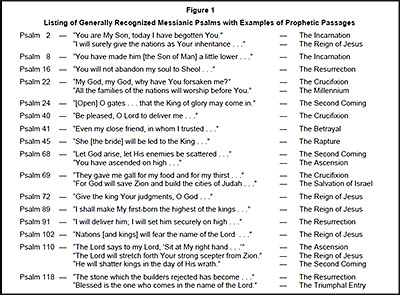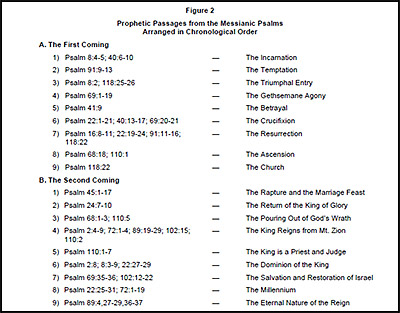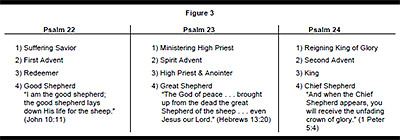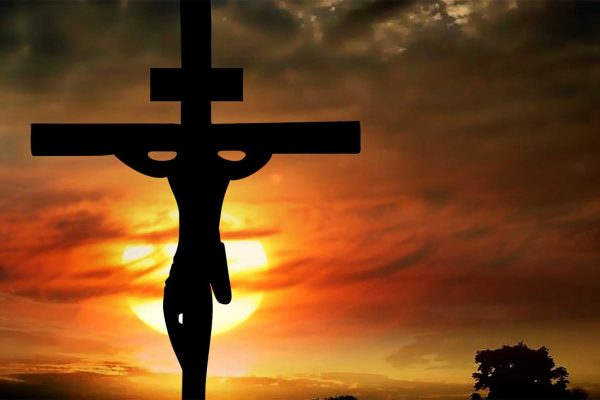Prophecy in the Psalms
A Major Repository of Messianic Prophecies

When teaching on the importance of Bible prophecy, one of the points I always mention is the quantity of prophecy that the Bible contains. I stress that anywhere from one-fourth to one-third of all the Scriptures are prophetic in nature, and that fact alone should be sufficient to compel our study of prophecy. I then remind my audience that we are told in 2 Timothy 3:16-17 that “All Scripture is inspired by God and profitable for teaching, for reproof, for correction, for training in righteousness; so that the man of God may be adequate, equipped for every good work.” And “all Scripture” certainly includes prophecy.
Most Christians are completely unaware of how much of the Bible is devoted to prophecy, just as most are unaware of the fact that the Bible is the only book in the world that contains fulfilled prophecies. There are, for example, no fulfilled prophecies in the Quran, the Hindu Vedras or the Book of Mormon. In contrast, the Bible contains hundreds of prophecies that have already been fulfilled — prophecies about people, towns, nations, empires and the Messiah.
Getting back to the quantity of prophecy, consider the fact that one out of every 25 verses in the New Testament have to do with the Second Coming of Jesus. And the Gospels are full of prophecies about Jesus’ death, burial and resurrection.
The New Testament contains entire books dedicated to prophecy — like 1 and 2 Thessalonians and Revelation. The Gospels contain lengthy passages devoted to prophecy. Consider, for example, Matthew 24-25, Mark 13, Luke 21 and John 14-17. Other lengthy prophetic passages are scattered throughout the New Testament — Acts 1, Romans 9-11, 1 Corinthians 15, 1 Timothy 4, 2 Timothy 3-4, Titus 2, 1 Peter 1 & 4 and 2 Peter 3.
In the Old Testament, we immediately think of the Major and Minor Prophets — a total of 16 books. But these books are not the only ones in the Hebrew Scriptures that contain prophecy. Major prophetic passages can be found in the history books, a good example being Deuteronomy 28-30 where Moses prophecies that the Jewish people will one day be scattered worldwide and they will be persecuted wherever they go, but they will be preserved and regathered to their homeland.
The history books also contain Messianic prophecies. The virgin birth of the Messiah is prophesied in Genesis 3:15. In Deuteronomy 18:15-18 Moses prophesied that the Messiah would be a prophet. In Genesis 12:1-3 God promised Abraham that the Messiah would come through his lineage, and in Genesis 49:8 Jacob prophesied that the Messiah would come from the tribe of Judah. The prophecy that the Messiah would come from the house of David within the tribe of Judah is stated in 2 Samuel 7:8-16.
The Neglected Prophecies
Perhaps the most overlooked area of the Old Testament with regard to prophecy is the book of Psalms. It’s a major repository of Messianic prophecies concerning both the First and Second Advents of the Messiah. Some are direct and clear. Others are indirect and subtle.
Most scholars acknowledge that 16 of the Psalms are distinctly Messianic in nature. They are listed below in Figure 1.

All but three of these Psalms are directly quoted in the New Testament and applied to Jesus. The three not quoted are Psalm 24, Psalm 72, and Psalm 89. The most frequently quoted is Psalm 110. It is mentioned a total of fourteen times in the New Testament, more than any other Old Testament passage. Three other of these Messianic Psalms are mentioned frequently in the New Testament. They are Psalms 2 and 69, mentioned seven times each, and Psalm 118 which is cited a total of six times.
Together, these 16 Messianic Psalms present a panoramic survey of the First and Second Comings of Jesus. Figure 2 presents passages from these 16 psalms arranged in chronological order according to the events in the life of Jesus.

Other Messianic Psalms
The Messianic prophecies in the Psalms are by no means limited to the 16 which are referenced above. I would add the following 17 Psalms to the list as ones that are obviously Messianic in nature, relating to the Lord’s Second Coming:
- Psalms 18 and 21— Contain vivid and detailed descriptions of the Lord’s return in wrath. (Psalm 18:7-19 and Psalm 21:8- 13)
- Psalm 46 — Pictures the exalted Lord in the midst of Jerusalem following His triumphant return.
- Psalm 47 — A song of joy celebrating the Lord’s reign as King of kings.
- Psalm 48 —The beauty of millennial Jerusalem.
- Psalm 76 — A description of the battle of Armageddon.
- Psalms 95, 96, 97, 98, 99 — Songs of joy celebrating the Lord’s reign over the nations.
- Psalms 145, 146, 147, 148, 149, 150 — Praise songs celebrating the glory, majesty, and goodness of the Lord’s reign.
The addition of these 17 Psalms gives us a total of 33 Messianic Psalms. But even these 33 do not exhaust the rich treasure of prophetic material that is contained in the Psalms. In fact, the fundamental prophetic theme of the Psalms is not even reflected in any of the Messianic Psalms thus far identified.
Prophetic Themes
The basic prophetic focus of the Psalms is the suffering of the Jews during the Tribulation. From Psalm 3 through Psalm 144, there are 59 prayers for deliverance from tribulation. Twelve entire Psalms (80, 82, 88, 90, 120, 126, 129, 137, & 141- 144) are devoted to earnest cries for deliverance from intense suffering.
Some might object to classifying these passages as prophetic in nature, arguing that they are simply the prayers of David and others who cried out to God in the midst of desperate situations. But some of the prayers are definitely national in nature (for example, Psalms 80 and 83). Some refer to specific wars in the end times, like Psalm 83. Others describe situations so horrible that they seem to point to the Great Tribulation for their fulfillment (see Psalms 14, 60, and 94).
As for the prayers that are definitely personal in nature, keep in mind that such utterances can have profound prophetic significance. The classic example is Psalm 22 where David in a moment of desperation cried out,“My God, my God, why have You forsaken me?”This was a personal prayer of David’s, yet it was prophetic of the incredible agony that Jesus would suffer on the Cross when the sins of Mankind were placed upon Him and His perfect communion with His Father was broken for the first time. David’s words became the Lord’s words as He suffered on the Cross.
Likewise, I have no doubt that the Jews will turn to the Psalms in the midst of the Great Tribulation and pray these very prayers to God for their deliverance from God’s wrath and the wrath of the Antichrist. Imagine yourself as a Jew in the Tribulation, hated by the nations and hunted like an animal by the Antichrist and his forces, and then read Psalm 88.
Statements of Faith, Rejoicing and Thanksgiving
Many of these heart-wrenching prayers are interspersed with triumphant statements of faith in God, as if the one crying out so desperately is trying to reassure himself that God is listening and will answer. Psalm 68:19-20 is typical:
Blessed be the Lord,
Who daily bears our burden,
The God who is our salvation.
God is to us a God of deliverances;
And to GOD the Lord belong
escapes from death.
There are 46 such affirmations of faith contained in the prayers for deliverance. I can imagine the hard pressed Jews reading, memorizing, and reciting these statements during the darkest days of the Tribulation. Keep in mind, the prophet Zechariah says that two-thirds of the Jews will be destroyed during those terrible years (Zechariah 13:8).
Another repetitive theme of the Psalms is rejoicing and thanksgiving for the Lord’s deliverance. Take Psalm 66 for example. It is an emotional and uninhibited song of praise for the national deliverance of Israel. You can imagine the leaping and clapping and dancing of the Jewish Remnant as you read the opening lines: “Shout joyfully to God, all the earth; sing the glory of His name; make His praise glorious!”
Sometimes a single Psalm will contain all three of these prophetic themes: 1) A cry for deliverance; 2) A statement of faith; and 3) A song of praise for God’s delivering response. Psalm 54 is a good example of the combination of these themes:
- The Cry for Deliverance — “Save me, O God, by Your name, and vindicate me by Your power. Hear my prayer, O God; give ear to the words of my mouth. For strangers have risen against me, and violent men have sought my life; they have not set God before them” (vs. 1-3).
- The Expression of Faith — “Behold, God is my helper; the Lord is the sustainer of my soul. He will recompense the evil to my foes; destroy them in Your faithfulness” (vs. 4-5).
- Praise for Deliverance — “Willingly I will sacrifice to You; I will give thanks to Your name, O LORD, for it is good. For He has delivered me from all trouble; and my eye has looked with satisfaction upon my enemies” (vs. 6-7).
Prophetic Units
A fascinating aspect of the Psalms is that they contain clusters of prophecies that relate to each other. The best known of these clusters is the prophetic trilogy of Psalms 22, 23, and 24.
Psalm 22 pictures Jesus in agony on the Cross. In Psalm 23 He is our resurrected High Priest, shepherding His flock through the power of His Spirit. In Psalm 24, He is the King of Glory who has returned to Jerusalem to reign over the nations. See Figure 3 below.

Other significant prophetic clusters in the Psalms are listed below:
A. Psalms 45-48
1) Psalm 45 — The Rapture
2) Psalm 46 — The Second Coming
3) Psalm 47 — Hallelujah! Jesus Reigns!
4) Psalm 48 — The Glory of Millennial Jerusalem
B. Psalms 52-54
1) Psalm 52 — The Fate of the Antichrist
2) Psalm 53 — The Fate of the Ungodly
3) Psalm 54 — The Fate of the Godly
C. Psalms 65-67
1) Psalm 65 — Praise for the Millennial Bounty of Nature
2) Psalm 66 — Praise for the Jew’s Deliverance
3) Psalm 67 — Praise for God’s Equitable Judgment of the Nations
D. Psalms 109-111
1) Psalm 109 — Prayer for the Destruction of the Antichrist
2) Psalm 110 — Jesus Triumphs and Reigns as King and Priest
3) Psalm 111 — Praise to the Lord for His Faithfulness in Keeping His Covenant Promises
E. Clusters of the Major Prophetic Themes
1) Psalms 3-7 — Cries for Deliverance
2) Psalms 103-105 — Expressions of Faith
3) Psalms 141-144 — Praises for Deliverance
4) Psalms 95-99 — Celebrations of the Lord’s Reign
5) Psalms 145-150 — Praises of the King of Kings
Psalms 45 to 48
Let’s take a closer look at one of these clusters whose psalms focus on the return of Jesus:
- The Rapture — “The King’s daughter is all glorious within; her clothing is interwoven with gold. She will be led to the King in embroidered work; The virgins, her companions who follow her, will be brought to You. They will be led forth with gladness and rejoicing; they will enter into the King’s palace” (Psalm 45:13-15).
- The Second Coming — “The nations made an uproar, the kingdoms tottered; He raised His voice, the earth melted. The LORD of hosts is with us; The God of Jacob is our stronghold. Come, behold the works of the LORD, Who has wrought desolations in the earth. He makes wars to cease to the end of the earth; He breaks the bow and cuts the spear in two; He burns the chariots with fire. ‘Cease striving and know that I am God; I will be exalted among the nations, I will be exalted in the earth.’ The LORD of hosts is with us; the God of Jacob is our stronghold” (Psalm 46:6-11).
- Hallelujah! Jesus Reigns! — “O clap your hands, all peoples; shout to God with the voice of joy. For the LORD Most High is to be feared, a great King over all the earth. He subdues peoples under us and nations under our feet… Sing praises to God, sing praises; sing praises to our King, sing praises. For God is the King of all the earth… God reigns over the nations” (Psalm 47:1-8).
- The Glory of Millennial Jerusalem — “Great is the LORD, and greatly to be praised, in the city of our God, His holy mountain. Beautiful in elevation, the joy of the whole earth, is Mount Zion in the far north, the city of the great King. God, in her palaces, has made Himself known as a stronghold… Let Mount Zion be glad, let the daughters of Judah rejoice because of Your judgments. Walk about Zion and go around her; count her towers; consider her ramparts; go through her palaces, that you may tell it to the next generation” (Psalm 48:1- 3, 11-13).
Chronological Aspects
A popular theory in the late 20th Century theorized that the Psalms contained a chronological code. This theory was spelled out in detail by J. R. Church in his book, Hidden Prophecies in the Psalms (1986). The thesis was that since the book of Psalms is the 19th book of the Old Testament, it represents the 1900s, and thus Psalm 1 is prophetic of 1901, Psalm 2 of 1902, and so on. Psalms 88-94 were viewed in this interpretation as a picture of the Tribulation Period, corresponding to the years 1988-1994.
The theory was very unconvincing to me. First, it suggested Kabbalism, a form of Jewish mysticism that claims the real message of Scripture is encoded below the surface words. But a greater problem is that it did not line up with historical events.
For example, there is nothing in Psalm 48 that is prophetic of the re-establishment of the State of Israel in 1948. The Psalm is all about the beauty of Jerusalem. After the dust settled in the 1948 War of Liberation, Jerusalem was not even a part of the newly established Jewish State! The Jews did not re-occupy the city of Jerusalem until the Six Day War of 1967, yet Psalm 67 does not even mention Jerusalem.
A further problem for this theory of interpretation was presented by the fact that the Rapture of the Church is clearly portrayed in Psalm 45 where the Bride is pictured as being led to the Bridegroom-King. Yet, the Rapture did not occur in 1945. Also, Psalm 93 portrays the reign of the Lord — before the Tribulation was supposed to end in 1994!
Of course, with the passage of time, this once popular chronological theory has been completely disproved.




